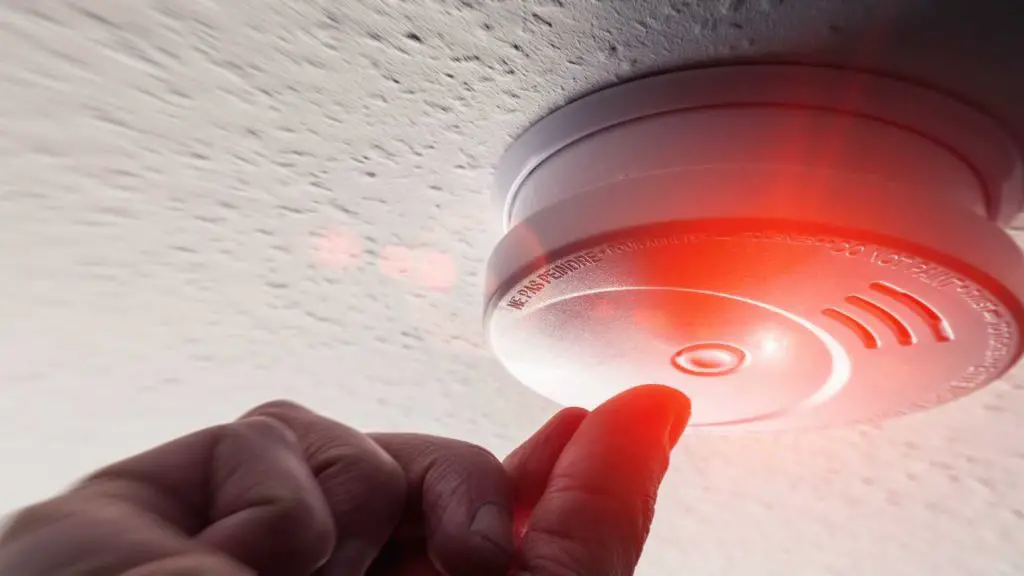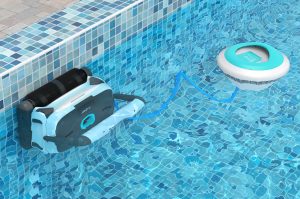Is your smoke alarm randomly going off? Do you wonder what could possibly have triggered it even when it doesn’t seem like there’s smoke or fire?
Smoke alarms are an essential part of any home’s safety system, providing a warning signal in case of fire or smoke. However, it can be frustrating when the smoke alarm goes off for no apparent reason. Not only does it create panic and confusion, but it can also be a nuisance to everyone around.
In this Home Centrale article, we will explore some common reasons why your smoke alarm is randomly going off and what you can do to fix the issue.
Reason 1: Low battery
One of the most common reasons behind a false fire alarm is low battery power. The majority of smoke detectors have batteries that need to be replaced periodically. If they are not changed on time, they may trigger false alarms as their power level drops below critical levels.
To avoid such scenarios from occurring frequently, ensure that you replace your device’s batteries regularly – every six months should suffice.
Solution 1: Replace the battery
If your smoke detector starts chirping intermittently or giving out random alerts without any signs of danger, then the chances are high that its batteries have been drained significantly enough to cause malfunctioning. In this case:
- Open up the device by removing its cover
- Replace with fresh new alkaline batteries
- Close back up again
Once you’ve done so successfully, test if everything works fine now by pressing down on its “test” button for about five seconds – you’ll hear two short sounds followed by one long beep if successful.
Reason 2: Dust accumulation
Another reason why your device might trigger random alarms is due to dust accumulation within them over time – especially where there’s heavy foot traffic like hallways leading into bedrooms or living rooms.
As dust accumulates inside these devices’ sensors over time, their sensitivity towards detecting real threats declines while simultaneously increasing their probability of generating false positives (i.e., triggering an alert even when there’s no actual danger or smoke).
Solution 2: Clean the device
To prevent dust buildup, it is essential to clean your smoke detector regularly. You can do this by:
- Removing the cover of the device
- Vacuuming or brushing off any visible debris and dust from its surface areas
- Using a soft-bristle brush to get rid of any remaining particles that cannot be reached with an ordinary vacuum cleaner (e.g., corners and crevices)
- Reinstalling the covers back on securely.
It’s recommended to clean your detectors at least once every few months for optimal performance.
Reason 3: Cooking fumes
Cooking activities such as frying or broiling meats can send out heavy vapors, which might mistakenly trigger false alarms in certain devices located near kitchen areas. This phenomenon usually happens when there’s a lack of ventilation within your cooking area.
Solution 3: Relocate the device
If you think cooking fumes are causing random alarms in your home, consider relocating detectors away from these high-risk areas – like kitchens – into other parts of your house where they’re less likely to be triggered accidentally by heat/smoke emanating from stovetops or ovens.
Alternatively, install special kinds of sensors specifically designed for use around kitchens and food preparation zones; they’re typically more resistant to false positives than traditional models sold without such features.
Reason 4: Humidity levels
High humidity levels can also cause smoke detectors to malfunction due to moisture buildup inside their sensors leading them towards generating false alerts about possible risks even if none exist at all.
For example, steam caused by showering/bathing may trigger some types of sensors used in bathrooms because their design hasn’t considered moisture effects fully yet – leading them towards issuing warnings regardless of whether real threats pose themselves nearby.
Solution 4: Ventilate affected rooms
To avoid this problem altogether, ensure that any room with high humidity levels is well-ventilated to keep moisture at bay. You can do this by opening windows, running fans, or installing dehumidifiers in rooms where necessary.
Reason 5: Faulty wiring
Another reason why your smoke alarm might falsely go off randomly could be due to faulty wiring. If the device’s wiring is damaged or loose, it may cause random signals that trigger an alert without any real danger available nearby.
Solution 5: Call a professional
In such cases, you need to call in professionals who specialize in electrical maintenance and repair services like electricians for help. They can diagnose and fix any issues related to faulty wiring of your smoke detectors within no time!
Reason 6: Ageing devices
Smoke alarms have a limited lifespan; their sensors will eventually wear out after several years of use – usually between five and ten years depending on the brand/model used.
As these sensors deteriorate over time, they tend towards generating false positives more frequently than before – leading homeowners into believing there’s an actual fire/smoke threat when none exists anywhere near them!
Solution 6: Replace aging devices
If you suspect that age may be causing malfunctioning issues with your smoke detector(s), consider replacing them altogether with newer models from reputable manufacturers. It’s also worth mentioning here that newer models come equipped with advanced features designed explicitly for eliminating false positives caused by the environmental factors mentioned above – giving users peace of mind knowing their homes are always safe from potential dangers around-the-clock!
conclusion
Overall, having a smoke detector installed in every room of the house is essential for ensuring optimal safety against possible fires or other hazards that could pose significant risks if left unchecked.
However, as we’ve seen throughout this article, many factors play into how well these critical life-saving tools perform under various circumstances making it important not only to know what causes them but also how best one should handle situations when false alarms occur. So, keep our tips in mind above and stay safe always!






